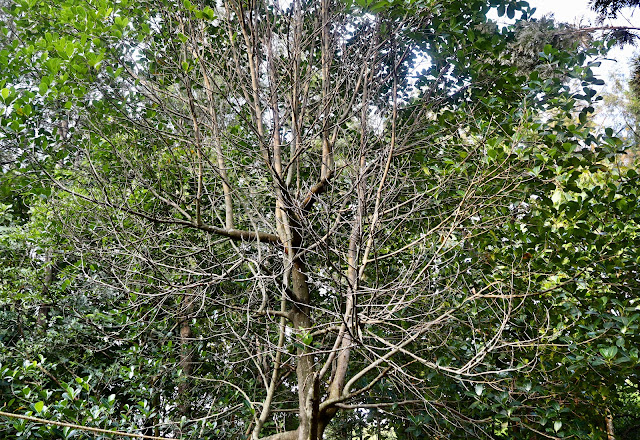
The four photos above give another story of the garden. The trees grow normally in the garden. The cashew tree displaced sideways by a fig tree, which spread its branches over it, is showing tender colourful leaves, suggesting the flowering and fruiting season.
The flowers offer nectar and a bee is receiving its nectar.
The tall and slender trees in the garden is a canopy which allows light to fall on the ground because of which the lawn grass carpets the ground shielding away weeds from their overgrowth.
A student of Botany would look at this diverse phenomenon and would be forthcoming with scientific rationale behind all these happenings.
For me, it was a sight that took me to the history of my involvement with families of developmentally challenged children, for forty years, when I listened to stories of families who had a broad canvas of happenings in their family life.
One thing was common between families. As soon as the family noticed that their child was different from others or a sibling, the anxiety level afflicted them and disturbed their journey in life.
There were families which remained frozen, some shattered, some resilient, some grieving and some coping !
Some stories of coping and resilience came up in my mind.
A family whom I met twenty years ago, sent me a letter recently about the progress of their son with whom I have had no contact for 12 years. They spent their time away from their home town over these years in order to offer suitable educational ambience for their son, because of which he is now in a skill development programme in preparation for self employment. The letter was one of recollections of happy memories and narration of the multiple abilities of their son. What enabled that family to move on was supporting friendships and affirming professional support.
The traumatised trees can loose their life or return to life because of resilience.
How do traumatised people return to life! Some can go through memories of anger, and grieving over the losses. Some remained stunted emotionally and socially in spite of some experiences of recovery. Some others found new strength and motivation to leave the mantle of sorrow and disappointment and work on healing experience inwardly.
In the biography of Rev Henry Nouwen, there was a turning point when he turned his loneliness to 'essential aloneness' to find the recovery path, which is referred to in his book, Seeds of Hope, page13.
Let me quote:" Instead of running away from our loneliness, or trying to forget or deny it, we have to protect it and turn it into a fruitful solitude. To live a spiritual life we must first find the courage to enter in to the desert of our loneliness and to change it by gentle and persistent efforts in to a garden of solitude. This requires not only courage but also a strong faith. As hard as it is to believe that the dry, desolate desert can yield endless varieties of flowers, it is equally hard not to imagine that our loneliness is hiding unknown beauty. The movement from loneliness to solitude, however, is the beginning of any spiritual life because it is the movement from restless senses to the restful spirit, from the outward-reaching cravings to the inward-reaching search from the fearful clinging to the fearless free play.....These are hard questions because they come forth out of our wounded hearts, but they have to be listened to even when they lead to a difficult road. This difficult road is the road to conversion, the conversion from loneliness into solitude"
A psychotherapist with background in theology, musicology, and religion, Thomas Moore in his book, A Life at Work, The joy of discovering what you were born to do, referring to the alchemists in the introduction to the book, wrote that, " An alchemist approached his work as though his life was dependent on it. He believed that the opus is the most important thing you do in life. Your work is equally important, too, not just as a means of making a living but as the medium through which you become a person" (pX111).
The process of becoming a person is by recovery from the wounded state begins with opus, a life work to process our experiences and integrate with the calling to live purposefully.
The willingness to enter into this process to meet with ourselves in the privacy of our life is the starting point to find fullness in life, living and learning. A ruler came to Jesus of Nazareth( Luke 18: 18-23) asking, 'Teacher, what shall I do to inherit eternal life?' ! He having confessed that he followed the commandments of God from his youth, Jesus told him, 'sell all that you possess and distribute it to the poor...' When the ruler heard this he became sad as he was extremely rich. The undue attachment to his wealth, which possessed him to be a protector of his wealth, came as a hindrance to find freedom from enslavement to his material pursuit.
The trees did not abandon their will to overcome and grow to be fruitful! But humans can stray and remain stranded without entering into the recovery process, as the path of solitude and processing would involve going beyond the control of experiences or attachments that keep us entangled.
I returned from the walk in the garden, aware of hope that dwells within each of us, hope that leads us to cross the bridge to the other side of daily living beyond despair, anger or loss!
M.C.Mathew(text and photo)











No comments:
Post a Comment